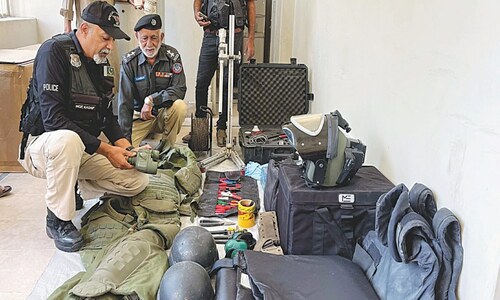KARACHI: Experts on Thursday called for engagement of local communities for preservation of heritage treasures as Sindh Culture, Tourism and Antiquities Minister Sardar Ali Shah said the government would organise an international conference on Makli at the World Heritage Site in Thatta district in January.
“We are going to organise the first such international conference on Makli in Makli on Jan 13 and 14,” said Mr Shah while addressing the concluding session of the two-day inter-regional workshop of the Unesco-World Heritage Centre (WHC) and Unesco Islamabad held at the National Museum Karachi.
The seminar was titled ‘World Heritage and Sustainable Development: The Role of Local Communities’.
The event — funded by the Republic of Korea — brought together several national and international experts to facilitate discussions on the role of community involvement in conservation of World Heritage Sites, as well as other cultural sites of global significance.
International conference on Makli to be held in January
The minister applauded the role of Unesco for its “excellent” intervention in involving local communities in the protection and preservation of great archaeological sites, bringing communities closer to their heritage, reviving ancient arts and taking pride in living around the centres of great archaeological history.
“Let me take this moment to assure all of you that this ministry of Sindh will take up this component after its successful implementation and showcasing by Unesco and its partners,” he added.
Mr Shah said the workshop had “provided us a unique opportunity to witness the success stories from across the regions” for safeguarding the heritage sites through the involvement of local communities.
“We are fortunate to be the descendants of one of the oldest Bronze Age civilisations; and, we have seen its continuity in various forms of our tangible and intangible cultural expressions. We are proud that two of the world’s heritage sites which are unique in their history, art, architecture and archaeology, are in Sindh.
“It has been through the great architects and artisans of the times that these sites significantly developed, flourished and reached zenith in their contemporary civilisations.”
Earlier, experts from Bangladesh, Jordan, Nepal, Oman and Pakistan presented case studies at the workshop to identify best practices for the conservation of World Heritage Sites.
It is by developing good practices and prioritising the engagement of local communities that efforts towards conservation of monuments can occur in an inclusive manner; which in turn creates income-generating activities for the local communities.
The opening remarks were delivered by Vibeke Jensen, Unesco representative to Pakistan, highlighting how community involvement in world heritage protection could create peaceful and cohesive societies and further contribute to poverty alleviation through job creation.
Manzoor Ahmed Kanasro, director general, antiquities and archaeology, Sindh, welcomed the participants.
Junhi Han of the WHC at Unesco provided background on the institutional framework of community engagement at the World Heritage Sites as a launching pad for the series of discussions commencing through the proceedings of the workshop.
In the first session on sustainable development through local community involvement, Yasmeen Lari, CEO of the Heritage Foundation, presented her organisation’s work on the project, ‘Revitalisation of ancient glazed tiles in Sindh’.
She highlighted ways in which members of marginalised communities, particularly women, could be engaged in conservation tasks living in the vicinity of Makli.
She hoped further training could be provided to the community on kashi kari (mosaic art) through the Makli Kashi Centre established by the Heritage Foundation.
Several notable experts from around the globe presented their case studies.
They stressed the importance of involving community members in conservation efforts, stated the pressing need for the revitalisation of crafts through community engagement, urged the development of viable management systems for sites, as well as the use of scaled-up versions of community engagement models based on syntheses from other successful projects.
The workshop concluded with a brainstorming session and discussion among the participants and the case presenters, exploring new avenues for community engagement in the sustainable development of World Heritage Sites.
Minister Shah closed the workshop expressing his commitment to protect the rich cultural heritage of Sindh.
He shared various interventions where the Sindh government was trying to preserve, protect and promote heritage sites.
Published in Dawn, November 24th, 2017














































Dear visitor, the comments section is undergoing an overhaul and will return soon.